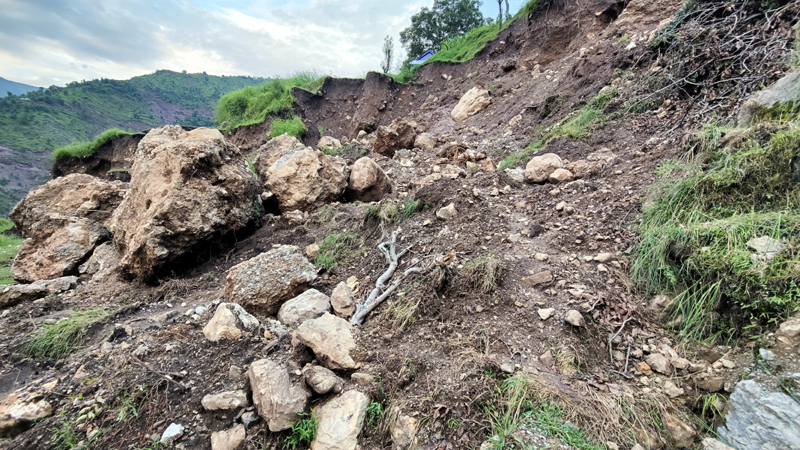Bassan disaster left 36 families homeless
Bivek Mathur
JAMMU, Jan 19: Close on the heels of Joshimath crisis in Uttarakhand that started in April last year, a complete village, Bassan in Reasi District, also sank into a nallah at the base of the village due to recurring landslides caused by undercutting between July 29 and August 1, last year, a Geology and Mining Department expert panel has concluded in its report submitted to Joint Director Geology and Mining, Jammu.
The subsidence crisis in Bassan village of Dharmari block damaged 25-30 houses of around 36 Kashmiri and nomadic Gujjar families, and tore through several hundred trees of walnut, apricot, apple and pine. Around 400 Kanals of the agricultural and horticultural land was also damaged in the disaster.
A 200 meters PMGSY road in the village also got downthrown by approximately 20-25 meters from its actual alignment, resulting in a panic among the villagers, who had to later stay in the houses of their relatives in the nearby villages or in the tents provided by the 58 RR unit of the Army.
Soon after the crisis, official sources said, a team of experts from Geology and Mining Department, Jammu and Kashmir, was constituted to visit the village and carry out a reconnaissance survey to find out the cause of the slides and to reach at a conclusion whether Bassan village post-disaster was fit for human habitation.
They said that after the panel was constituted, a team of Geologists visited the site of disaster, inspected the damaged kacha as well as pacca houses, PMGSY road in the village, besides the fruit as well as cereal crops and submitted its report to the Joint Director, Geology and Mining Department, Jammu.
Identifying the cause of subsidence in Bassan village and sliding of the village road, in its report, a copy of which is available with the Excelsior, the Geology and Mining Department’s panel concluded that the sliding activity in Bassan was triggered by cumulative effect of undercutting by the nallah overflowing at the base of the village Bassan.
“The presence of the phyllosilicates minerals within the soils/clays of the affected area swelled upon absorption of rainwater/spring water, became unstable due to increased pore pressure leading to liquefaction of soils and eventually failed along the steep slopes.
“The incompetent Murree strata on which the affected village is located comprises clay stones, mudstones, shales and red clays. These litho units are prone to failure as has been observed from many instances of landslide activity within the Himalayan region. The unstable soil slopes covered by agricultural fields slide due to decreased strength of soils resulting from continuous infiltrating of rainwater during the incessant rains between July 29 and August 1, 2022,” read the report.
On the basis of the field observations, official sources said, the expert panel has also concluded that the affected area in Bassan village is not feasible for human habitation though agricultural activities could be carried out in the village.
It is important to mention here that all the affected villagers in Bassan were paid an immediate relief of Rs 5000 per family for the losses they suffered in the recurring landslides in their village between July 29 and August 1, 2022 and were assured a sum of Rs 1 lakh under the SDRF norms after the assessment of their losses by the Revenue Department teams.
But one of the villagers, Ghulam Mohiuddin, 43, told the Excelsior: “the administration has paid Rs 1 lakh as full compensation to only 12-13 families. The rest of the affected villagers are mulling to approach the court soon to press the administration for the release of the relief”.
DC Reasi, Babila Rakwal, however, said that compensation was provided to all the deserving families after the field visits and assessment of the actual losses by the top Revenue officials of the district.
“No genuine case is left out,” said the DC Reasi.


